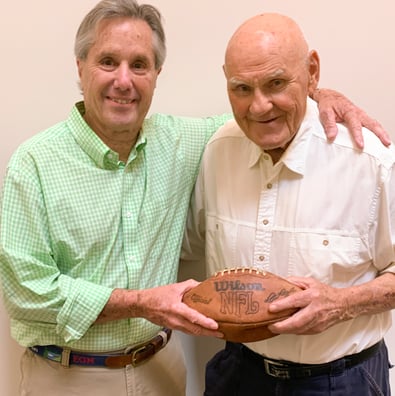
These days, it’s hard to imagine that United would ever have fielded a football team—flag or full contact. More than 50 years ago, however, it almost made sense. As Ted Meads (’71) and former seminary student Phil Johnson (pictured at right) recall, “When school started in the fall of 1967, a gaggle of seminarians played touch football on campus most afternoons.” There were also other sporting events.
It is important to remember that seminarians and faculty in the 1960s were predominantly male. United’s first woman MDiv graduate, Marilyn Creel, didn’t cross the stage until 1972, and the first female faculty member on regular appointment, Patricia Wilson Kastner, wasn’t installed until 1975.
So, when Mike Groh* (’69) asked his seminary mates if they wanted to play full-contact football against the Stillwater Prison football team, he was able to assemble a team, albeit a small one. At the time, Mike and Gary Miller* (’68) were ministering at the prison and had learned that the Colts (the prison team) had an opening in their schedule.
The Motivation for Playing
Fielding a football team was not a meaningless diversion for seminary students. Between seminary classes, clinical pastoral education opportunities, and internships, the men were plenty busy. Ted and Phil like to think of this exercise as part of a continuum of practical social ministry promoted by United and its faculty.
As they recollect, seminarians had driven to Milwaukee to march with activist Father James Groppi in support of a strong open housing law in the city. Others had gone door-knocking on behalf of candidates who opposed the Vietnam War. Several of their classmates interned with the Inner-City Project for Youth, formed by three Minneapolis churches in 1968, and those who took Wilson Yates’ Religion and Society course visited prisons in Lino Lakes and St. Cloud.
Logistics
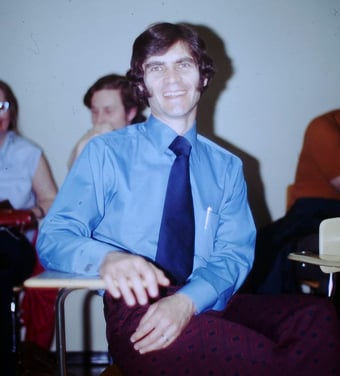 Outfitting a team with protective gear was the first challenge. Happily, Gary was able to borrow used shoulder pads and helmets from the high school at which he was working in 1967. In 1968, Dave Rumpf (’70) collected used football equipment from Augsburg College where he was interning.
Outfitting a team with protective gear was the first challenge. Happily, Gary was able to borrow used shoulder pads and helmets from the high school at which he was working in 1967. In 1968, Dave Rumpf (’70) collected used football equipment from Augsburg College where he was interning.
The title of coach went to Professor Donald White,* United’s Professor Emeritus of Constructive Theology (1965–2002), pictured at left. Dr. White enjoyed the game and liked to view it from a process theology angle.
As Don explained recently, “The key element of process theology demands a focus on the concrete, the specific at all levels, including the sub-atomic. For football, you are driven to the specific, the concrete, in all of its complexity. The second key element states that God is always seeking to lead us, as well as all things in the universe, at the same instant.
“The problem remains that we are seldom aware of God’s leading, which seeks to move us toward the best possible outcome along with all of the particular universal participants. This means that God does not favor any team or player. [Phil and Ted] have often claimed that the best part of the experience of playing the prison football team remains the sharing of both food and conversation with the prison players, even though the prison team had lost. Seeing how their lives were not so different from our own, and being so accepted by their team members, demonstrates how harmony (rather than violence) feels better to us.
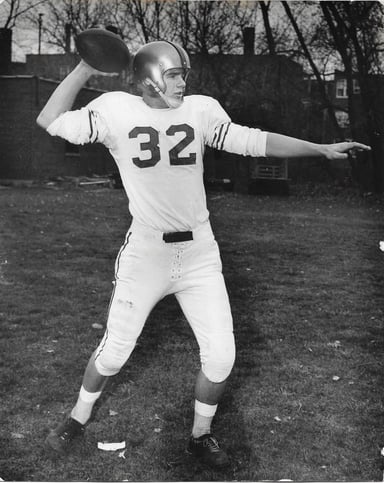 “As to the combative part of football, that is typical of human activity. We turn God's quest for harmony into combative violence, even though we can sometimes move toward a more peaceful and harmonious relationship. Notice how we flock to see violence and are bored by harmony.”
“As to the combative part of football, that is typical of human activity. We turn God's quest for harmony into combative violence, even though we can sometimes move toward a more peaceful and harmonious relationship. Notice how we flock to see violence and are bored by harmony.”
United’s student coaches were Mike and Phil, both of whom had played football collegiately—Mike at Hanover College in Indiana, where he was a co-captain of the team, and Phil at North Park College in Illinois (see photo at right).
Mike and Phil also determined the positions that each team member would play on offense and defense. Because they only had 11 players, each player needed to play at least two positions. According to Phil, who played quarterback and defensive tackle, “That’s the way to have fun!” Ted, an offensive and defensive lineman, didn’t remember it quite the same way. “I was running for my life!” he asserted last year.
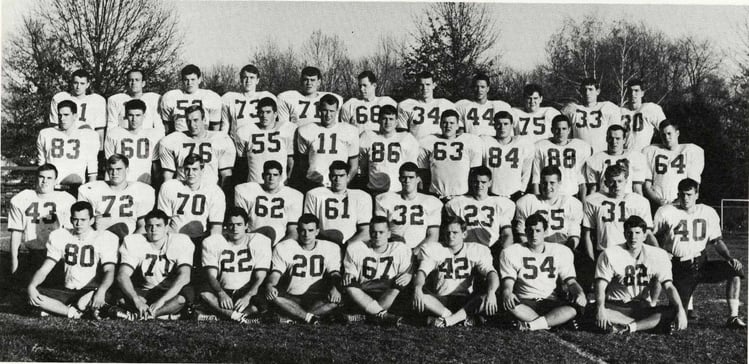
| This 1964 photo from Hanover College in Indiana shows #86, Mike Groh (’69)— a team co-captain—in the third row toward the center. |
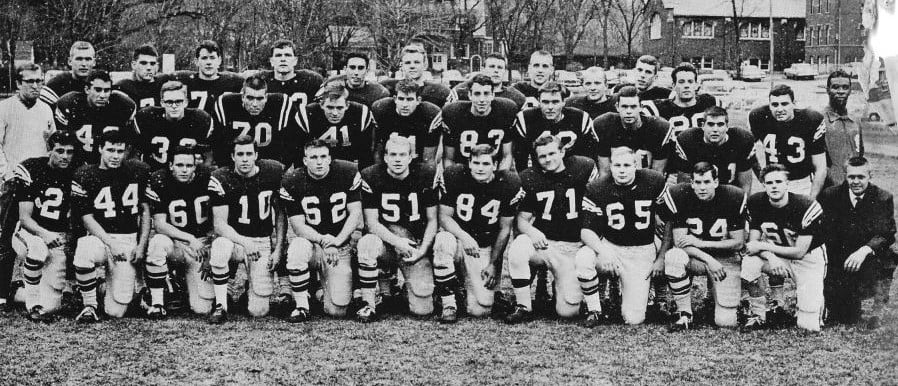
| This 1965 photo from Elmhurst College in Illinois (Reinhold and H. Richard Niebuhr’s alma mater) shows three of United’s football players: in the first row are #44, Rich Grobe (’72), and #51, Gary Miller (’68); #70, Hal Schippits (’69), is the third player in the second row. |
Game One at Stillwater Prison
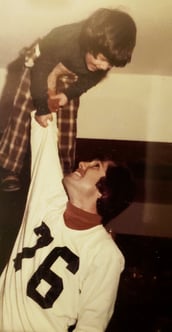 The Prison Mirror, a newspaper produced by inmates at Stillwater Prison since 1887, ran this headline in its October 20, 1967 edition: “Preachers Chill Colts.” The story began, “A good team from the United Theological Seminary combined an excellent passing and running attack to defeat the Colts in the rain by a score of 20–13.”
The Prison Mirror, a newspaper produced by inmates at Stillwater Prison since 1887, ran this headline in its October 20, 1967 edition: “Preachers Chill Colts.” The story began, “A good team from the United Theological Seminary combined an excellent passing and running attack to defeat the Colts in the rain by a score of 20–13.”
Highlights of the game included two key interceptions by Mike, a fumble recovery by Ted, and a lot of running (with judicious passing on occasion) by Phil, the quarterback. Ted remembers that when he recovered the fumble, he heard Mike yelling, “Get up and run! It’s a live ball!” By then, however, the Colts had covered him.
Ted still has the number 76 jersey he wore in that first game (see photo at left). “I kept that jersey as a survival trophy,” he explains.
Games Two and Three
According to Phil and Ted’s research, the Colts team routed United in the second game of 1967. As they wrote, “Our understaffed team was no match for ‘Ron the Bomb’ Holmes, who ran through and past us for 263 yards.” Rumors were that Holmes had been released from solitary the day before and was very keen to get out and run.
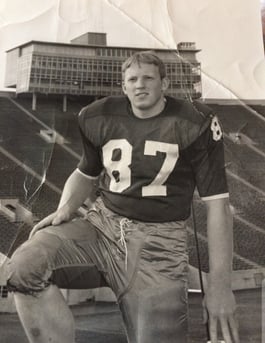 By the fall of 1968, when United played its third and final game at Stillwater prison, United’s roster had grown to 15. One of the 15 was Ken Groh, Mike’s brother, who, Ted asserts, “had never darkened the door of a seminary classroom.” Ken had, however, played football at Indiana University (see photo at right) and was a welcome addition.
By the fall of 1968, when United played its third and final game at Stillwater prison, United’s roster had grown to 15. One of the 15 was Ken Groh, Mike’s brother, who, Ted asserts, “had never darkened the door of a seminary classroom.” Ken had, however, played football at Indiana University (see photo at right) and was a welcome addition.
Highlights of that third game included United’s successful two-point conversion after their first touchdown, and a fumble recovery to keep the Colts out of the end zone. Phil took the ball in for United’s next touchdown and a second two-point conversion. Ultimately, the Colts came within one point of tying the game, and the final score was 22–21. Thank goodness for those two-point conversions!
The Prison Mirror article from the game concluded with this sentiment:
“A salute to Head Coach Donald White and his fine crew that he brought in, who, along with the Colts, played an extremely clean game of football. We’d like to note also that most of the players from the United team played offense and defense, and one in particular, Steve Steiner* (’71), who played despite a broken tooth and having the wind knocked out of him; he also scored the first touchdown for United.”
Breaking Bread Together
After the first game at Stillwater Prison, representatives from both teams met in a small dining room for a meal. Ted remembers that “conversations were animated, much of it focused on game highlights.” The men also swapped stories about their lives and dreams for the future.
During the meal and through the conversations, stereotypes on both sides began to dissolve. Phil and Ted note, “Inmates were tough guys, but they had families, thoughts, senses of humor, and feelings. For their part, seminarians were regular guys who weren’t afraid of a tough game, and were taking time to visit men in prison and share a meal.”
Ultimately, the games and meals, Ted and Phil share, “were a true example of what United preached as being open and responsive to others. It was a valuable lesson.”
Postscript
Despite their success on the gridiron, not one of the seminary players took up football as a career. Phil finished his seminary degree at Andover Newton and held several jobs, including pastor. He also founded and edited the journal Pietisten for 24 years. Mike spent his life working in and consulting with nonprofit organizations and developing community leaders. During his career, he worked with 500 groups in North America, Eastern Europe, and the Balkans supporting food security, environmental groups, and NGOs in nations with emerging democracies.
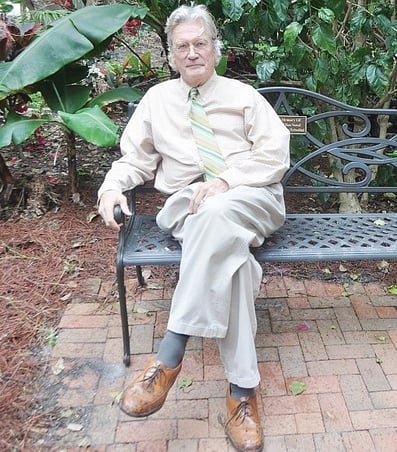 Through Mike, Ted got a job at the University of Minnesota as a chemical dependency instructor. Since finishing his MPH at the University, he has worked for a variety of healthcare companies, primarily in sales. He is currently the senior vice president for national sales at Welvie, a company that offers online learning programs to help people make more informed decisions about their care options.
Through Mike, Ted got a job at the University of Minnesota as a chemical dependency instructor. Since finishing his MPH at the University, he has worked for a variety of healthcare companies, primarily in sales. He is currently the senior vice president for national sales at Welvie, a company that offers online learning programs to help people make more informed decisions about their care options.
Vince Carroll (’71, pictured at left) was the last Protestant chaplain ordered “in-country” with the Major Marine Corps Unit, working with Force Logistics Command and supporting troops in Vietnam from Phu Bai to the DMZ. Hal Schippits (’69) served as a UCC minister in Minnesota’s National Guard and then directed Hennepin County’s Day Treatment and Dual Diagnosis programs.
Gary Miller served as a military chaplain too, but spent most of his life as a UCC pastor. Stephen Steiner and Rich Grobe (’72) were also UCC pastors. Don Miller (’71)—the team’s center, long snapper, and place kicker—went on to earn a DMin from Eden Theological Seminary and spent many years in parish ministry.
Closing Thoughts
As Ted reflects:
“During my four years at United, there were a number of events that bound the community together and spoke to the words in Matthew 36:25. Given the uniqueness of the prison football experience, it was perhaps the most dramatic expression of ‘social gospel’ at the time, but [very much in keeping with] the ‘social gospel’ espoused by the seminary. The United football team in the late 1960s perfectly exemplified our classroom lessons and I’ll be forever grateful for my seminary experience.”
Phil adds, “I definitely agree with Ted. United was intentionally a wide-open place. There was no lid on the freedom to try things.”
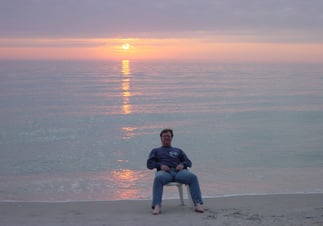 United is delighted to be able to share a story about the remarkable 1967–1968 football program and honor the players who invested their faith and risked their limbs in the process. We owe Ted and Phil credit for drawing our attention to their story and conducting important research, and are delighted that Professor Emeritus and coach Don White was able to give us a primer on process theology and football. Thanks also to Alicia Groh, Mike’s daughter, who tracked down photos of her dad (including him on the beach at sunset) for this article.
United is delighted to be able to share a story about the remarkable 1967–1968 football program and honor the players who invested their faith and risked their limbs in the process. We owe Ted and Phil credit for drawing our attention to their story and conducting important research, and are delighted that Professor Emeritus and coach Don White was able to give us a primer on process theology and football. Thanks also to Alicia Groh, Mike’s daughter, who tracked down photos of her dad (including him on the beach at sunset) for this article.
______
* Deceased



Your Comments :